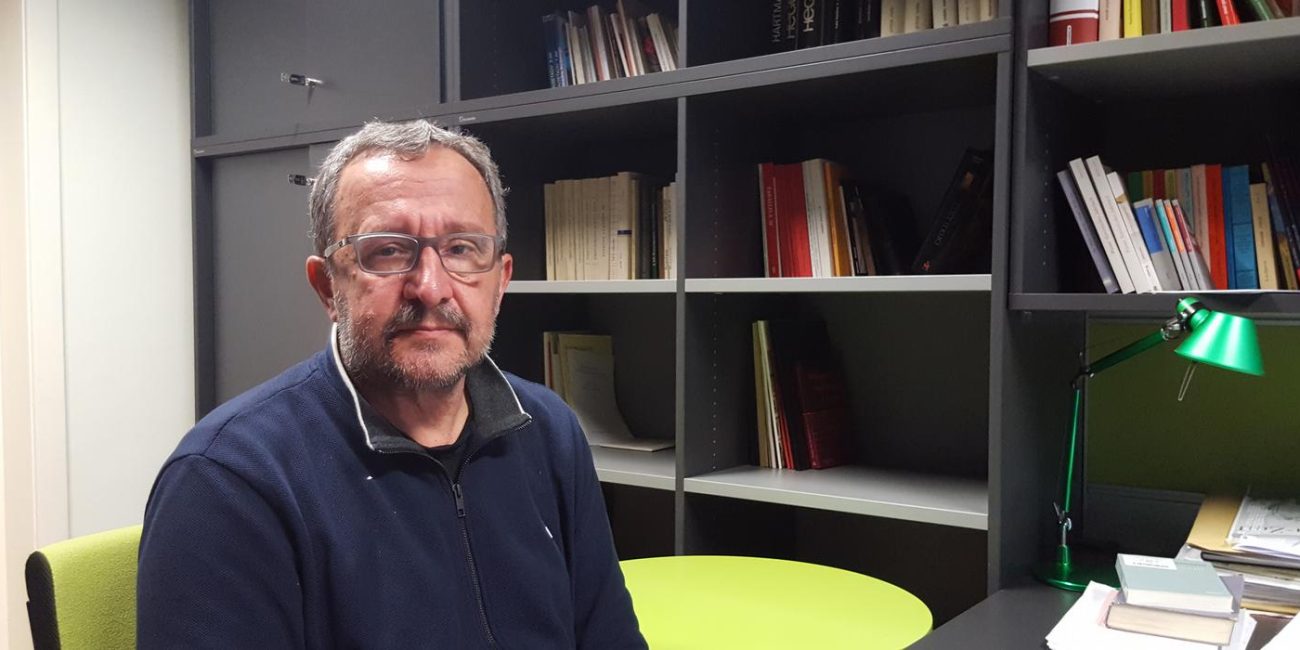MAY 9-10, 2025 | International conference
Theorizing (Sub)peripheries: Strategies of Synchronization in Southeast European Literary and Cultural Criticism (1821–2025)
Lucian Blaga University of Sibiu, Romania
KEYNOTE SPEAKERS

Vladimir Biti

Diana Mishkova
PANEL 1: From Formalism to (Post)structuralism
Room 3, Chair: Adriana Stan
Adriana Stan (Babes Bolyai University of Cluj-Napoca [UBB]/ULBS), The Linguistic Turn and Critical Modernization in Cold War Eastern Europe
Kamelia Spassova (Sofia University “St. Kliment Ohridski”/ ULBS), Intertextuality and Autotextuality: Powers of Repetition in Kristeva and Kolarov
Senida Poenariu (ULBS), Methodological reconfigurations in the work of Julia Kristeva, Thomas Pavel and Tzvetan Todorov
Roxana Eichel (University of Bucharest), Unfolding Continuities in Theoretical Shifts: Thomas G. Pavel’s Intellectual Trajectory Across “Regimes of Relevance”
PANEL 2: World-Systems Analysis, World Literature & More (I)
Room 1, Chair: Snejana Ung
Snejana Ung (ULBS), Small, Underdeveloped and Multinational Southeastern European Literatures: Svetozar Petrović’s Contributions to World Literary Debates
Blaž Gselman (University of Ljubljana), Is there a world-system of literary criticism?
Andrei Terian (ULBS), From “Minor” Literatures to Subperipheries
Alex Ciorogar (UBB), Hypo-Semiperiphery: Poetry as Sub-Commodity Chain and Authorship as World-Apparatus
PANEL 3: Critique of Speculative Science and Fiction
Room 1, Chair: Ștefan Baghiu
Stefan Baghiu (ULBS), Communist Cyberaesthetics and Literary Criticism: Beyond Structuralism, Not Quite Poststructuralism
Mihai Țapu (UBB), (Sub)peripheral Instrumentalizations of “Theory-Fiction”: Comparing the Romanian and Slovenian Cases
Mihai Iovănel (G. Calinescu Institute of Literary History and Theory/ULBS), The Present Begins Tomorrow: Theories of Science Fiction Literature and Utopia by Darko Suvin, Stanisław Lem and Cornel Robu
Mihnea Bâlici (UBB), Aspirational Postmodernism: The Naturalization of the Free Market Culture in Late and Post-Socialist Romania
PANEL 4: The Minor & Exile
Room 3, Chair: Ovio Olaru
Borislava Ivanova (Bulgarian Academy of Sciences), The Birth of the Balkan Intellectual and His Weapons in Intervening the Literary Field
Ovio Olaru (ULBS), Subaltern European Modernism: The Case for a Romanian-German Minor Canon
Alin C. Cîrtog (ULBS), Matei Călinescu and the Myth of the Hydra: A Paradigm of Critical Innovation that Overcoming the Southest European Periphery
Cristina Dicusar & Andreea Mironescu (Al. I. Cuza University of Iași), Post-imperial Nation Rebuilding: Strategies of Mixed Synchronization in the Republic of Moldova
PANEL 5: Cultural Theory (I)
Room 1, Chair: Vlad Pojoga
Noemi Stoichkova & Kristina Yordanova (Sofia University “St. Kliment Ohridski”), Mythmakers of the Subperiphery. The Bulgarian Revival in Toncho Zhechev and Nikolay Genchev’s Work
Boyko Penchev (Sofia University “St. Kliment Ohridski”/ ULBS), Naming the Nation’s Beginning. The interplay between “Revival” and “Renaissance” in the Bulgarian Literary Criticism
Vlad Pojoga (ULBS), The Participatory Regime of Relevance: A Framework Extension
Dimitar Kambourov (Trinity College Dublin/Sofia University “St. Kliment Ohridski”), (Re)Theorizing In-Betweeness: Strategies of Seeing the Lay of the Land of Two Bulgarian Literary Theorists Starting from the 1960s
PANEL 6: World-Systems Analysis, World Literature & More (II)
Room 3, Chair: Snejana Ung [online panel]
Marius Virgil Florea (Shanghai International Studies University), Toward an Embodied Methodology: Cognitive-Philosophical Pathways for Literary Criticism
Nadezhda Stoyanova (Sofia University “St. Kliment Ohridski”/ ULBS), Event and Cultural Identity. Three Cases from Bulgarian Cultural and Literary Criticism of the Early 1920s
Tijana Matijević (University of Belgrade), Praxis literary theory: Unmapped Yugoslav Marxist criticism beyond Cold War dichotomies
Aleksandar Mijatović (University of Rijeka/ULBS), The Temporality of Literary (Sub)peripherality
PANEL 7: Cultural Theory (II)
Room 1, Chair: Olga Bartosiewicz-Nikolaev
Teodora Dumitru (G. Calinescu Institute of Literary History and Theory/ ULBS), The “Autonomy of the Aesthetic” Theory: Philosophical and Scientistic Strands of Representing the Function of Literature in 19th and 20th Century Romanian Literary Criticism
Olga Bartosiewicz-Nikolaev (Jagiellonian University, Krakow/ ULBS), Revisiting B. Fundoianu’s Literary and Cultural Criticism
Daniel Coman (ULBS), Romanian Theories of Literary Character: The Narratological Perspective (1882-1997)
Aleksandra Antonova (Bulgarian Academy of Sciences), Boyan Penev’s Ideas on the Methods of Literary Critics
PANEL 8: World-Systems Analysis, World Literature & More (III)
Room 3, Chair: Maria Chiorean
Marko Juvan (ZRC-SAZU Ljubljana/ ULBS), Diagnosing Belatedness, Acceleration, Synchronicity in Slovenian Literature
Maria Chiorean (ULBS), Subperipheral Articulations of World Literature: De-Westernizing a Discipline in Soviet Russia, Romania, and Bulgaria
Doris Mironescu (Al. I. Cuza University of Iași/ULBS), Romancing the Periphery: Paths to cultural affiliation in early modern Romanian literature
CALL FOR PAPERS
While East-Central European literary criticism has attained a canonical status in modern literary studies, featuring figures such as György Lukacs in Hungary, Roman Ingarden in Poland, and the Czech scholars and Russian émigrés from the Prague Linguistic Circle, Southeast European literary criticism remains relatively obscure in mainstream academic discussions. However, even if literary theory was not developed in this region with the same coherence as in East-Central Europe, Southeast Europe is arguably the cradle of a specific cultural theory of peripherality.
To better understand both the status of the cultures in this region and the relevance of their theoretical production, we advance the concept of “subperiphery,” which is yet to receive its application in cultural and literary history. First, this term refers to a cultural and economic periphery that has largely failed to export or contribute the “raw material” for theoretical advances to what are usually seen as the core Western producers of theory. Second, building on Immanuel Wallerstein’s world-systems theory and informed by Galin Tihanov’s conceptualization of what he calls regimes of relevance, we understand the “subperiphery” as characterized by a hybrid regime of relevance that diverges from those defining the literary cultures of East-Central Europe during the same period. Unlike the unambiguous transitions observed in East-Central Europe, the subperiphery remained in a hybrid “aestethnic” state, a term we employ to explore the distinct coexistence of modern and traditional ways of theorizing in Southeast Europe that makes its literary and cultural criticism different from what one can observe in East-Central Europe. Third, the subperiphery is characterized by the “mutual ignorance” of “minor” cultures, indicating that the cultures in this region have not extensively shared ideas with each other.
Therefore, the subperiphery represents an initial stage of cultural marginality, in which distinct cultures have not yet been fully integrated into the world literary system. Our hypothesis is that this was the case of most critical cultures from the geopolitical region traditionally labeled as the “Balkans” (i.e., including countries like Romania, Bulgaria, Serbia, Croatia, Slovenia, Albania, etc.) from the middle of the 19th century until the middle of the 20th century. These countries become actual peripheries only much later, when the import of critical theories and concepts from the West is paralleled by export towards the West, as proven by names such as Tzvetan Todorov, Julia Kristeva, Mihajlo Mihajlov, Darko Suvin, Matei Călinescu, and Thomas G. Pavel.
However, we believe that the “cultural theory” produced in the Southeast European subperiphery is highly (and even more) relevant today, especially in reshaping discussions on the heterogeneity of world literature, in readdressing the status of “minor” or “insular” knowledge production, and in discussing the phenomenon of “traveling ideas.” For instance, the Romanian critic Eugen Lovinescu’s concept of “synchronism” (sincronism, 1924) can be placed in dialogue not only with the thesis of “accelerated development” (uskorennoe razvitie, 1964) of Bulgarian-Belarussian-Russian scholar Georgii Gachev and with the Croatian critic Svetozar Petrović’s idea of “atypical development” (atipičan razvoj, 1972), but also with Pascale Casanova’s theory of asymmetric “world literary space” and Franco Moretti’s “law” of foreign forms adapted to local contents.
Themes and topics:
We welcome papers that address, but are not limited to, the following areas:
- Historical intersections and divergences in literary criticism and cultural development in Southeastern Europe;
- The role of “Balkan” cultural theorists and critics in shaping ideas in Europe and beyond;
- Studies in different Southeast European “regimes of relevance” across space and time;
- The development of world “literary subperipheries” beyond Europe;
- Comparative nation-building narratives and their reflection in literature and criticism;
- The evolution of the Balkan subperiphery into a part of a larger constellation of centers and peripheries;
- The impact of geopolitical changes on literary theory and cultural criticism, particularly relating to the impacts of WWI, WWII, and the Cold War era;
- Analysis of key literary figures and critical works that shaped the cultural landscapes of Southeastern Europe;
- The role of literature in the formation of national identity and the negotiation of external cultural domination;
- Colonial, postcolonial, decolonial narratives of cultural development in Southeastern Europe.
Keynote speakers:
- Vladimir Biti, University of Vienna
- Diana Mishkova, Center for Advanced Study, Sofia
- Rastko Močnik, University of Ljubljana/ Singidunum University, Belgrade
Please submit a 250-word abstract along with a brief bio (100 words) to andrei.terian@ulbsibiu.ro and stefan.baghiu@ulbsibiu.ro by 05.03.2025 21.03.2025 (EXTENDED DEADLINE). Proposals should include the title of the paper, the main arguments, and the methodologies employed. E-mails should have the title “STRASYN 2025 Conference.” Notifications of acceptance will be sent by 10.03.2025.
The conference “Theorizing (Sub)peripheries: Strategies of Synchronization in Southeast European Literary and Cultural Criticism” is organised within the research grant STRASYN (https://grants.ulbsibiu.ro/strasyn/).